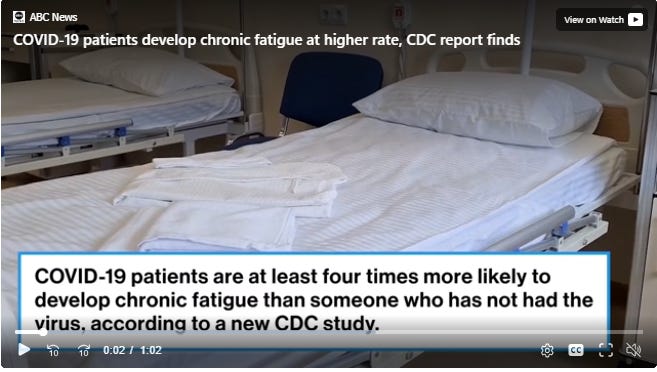A spanking new groundbreaking study from the CDC and from the future, “Estimates of Incidence and Predictors of Fatiguing Illness after SARS-CoV-2 Infection” (CDC Emerging Infectious Diseases, Volume 30, Number 3—March 2024) is purported to show that “COVID-19 patients are at least four times more likely to develop chronic fatigue than someone who has not had the virus, a new federal study published Wednesday suggests.” (ABC News, 2024.02.14):
Researchers from the Centers for Disease Control and Prevention (CDC) looked at electronic health records from the University of Washington of more than 4,500 patients with confirmed COVID-19 between February 2020 and February 2021. They were followed for a median of 11.4 months and their health data was compared with the data of more than 9,000 non-COVID-19 patients with similar characteristics. Fatigue developed in 9% of the COVID patients, the team found. Among COVID-19 patients, the rate of new cases of fatigue was 10.2 per 100 person-years and the rate of new cases of chronic fatigue was 1.8 per 100 person-years.
What was the most prominent event of the first half of 2021? Vigorous multi-round Covid vaccination, of course. To the credit of study authors, they recognize their study limitations:
First, because we used EHR data for this study, our findings apply only to patients who access care.
Second, data on exact date of onset, duration, and severity of fatigue or related functional limitations are unavailable for further characterization. The date of fatigue documented in EHR does not necessarily represent the date of symptom onset. In addition, providers might continue to document fatigue or carry forward the diagnosis. Therefore, relying on coding for chronic fatigue without an exact date of symptom onset might underestimate incidence of chronic fatigue. Moreover, the sense of fatigue is subjective and can be under-recorded if it is being considered as part of a disease process. The introduction of code U09.9, post COVID-19 condition, in October 2021 would not change results because it would need to be coded in conjunction with fatigue.
Third, data on COVID-19 vaccination were not recorded for most patients, precluding further analysis.
Fourth, the relatively small number of patients with fatigue who experienced hospitalization or death during follow-up precluded further multivariable analyses to adjust for potential confounders. The unadjusted association between fatigue and hospitalization or death might have been the result of the greater comorbidities seen in persons with fatigue.
Fifth, this article is focused on post–COVID-19 fatigue, but PCC is generally experienced with multisystem symptom clusters.
To boost, since when “fatigue” is a medical condition? Aren’t there any physiological factors involved in “chronic fatigue” that can be scientifically tested?
Unless we don’t want to know what this “post-Covid chronic fatigue” manifests.






"...data on COVID-19 vaccination were not recorded for most patients, precluding further analysis."
Interpretation prediction: We at the CDC are still trying to figure out a way to hide the data that shows the jab greatly enhanced or is mostly responsible for the "Chronic Fatigue" syndrome.
From the same people who brought you: "Safe and Effective" and "Pandemic of the Unvaccinated."
Since we now know they have codes to identify is who refused, they know the injection status of the participants, even if they excluded the data